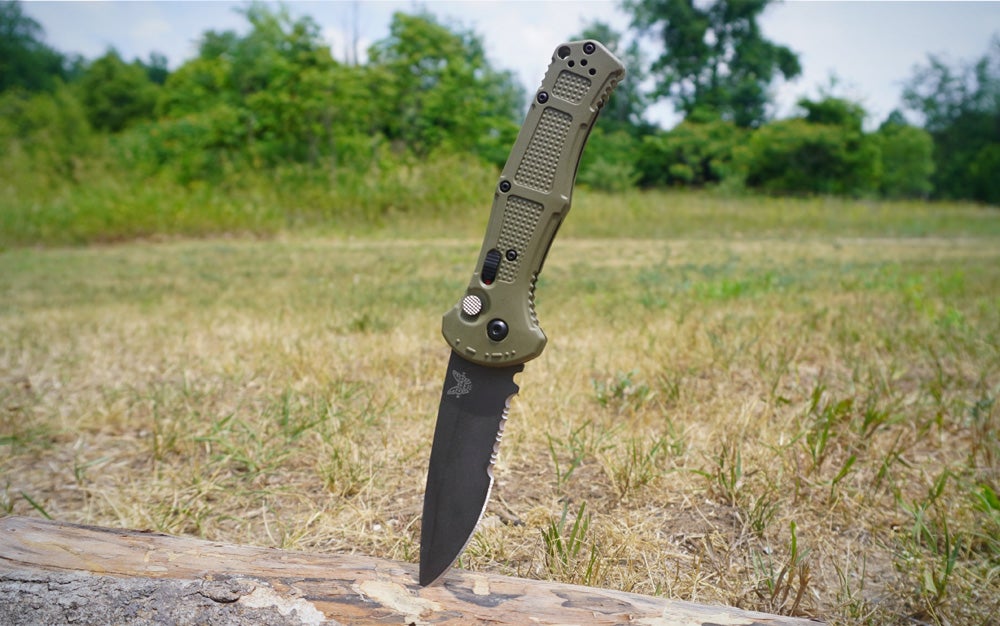We may earn revenue from the products available on this page and participate in affiliate programs. Learn more ›
The automatic knife is seeing something of a resurgence in popularity these days among knife enthusiasts as regular hard-working Americans are realizing just how handy they are for all different tasks. Given that you can operate them one-handed, they’re especially great for anyone who spends all day working with their hands. Today’s modern construction techniques and steel allows these blades to be lighter and hold an edge longer than the old-school stiletto switchblades first made popular in the 1950s and 60s. This makes auto knives some of the best EDC knives, as well.
With how versatile these knives are for working, bushcraft, and tactical purposes, it’s no wonder they are more popular than ever. With that in mind, we’ve rounded up some of the best automatic knives for a variety of uses and budgets.
Best Automatic Knives
Specs
- Blade Lengths: 3 or 3.6 in.
- Opening Type: Folding
- Mechanism: Push Button
- Blade Material: CPM-D2
Pros
- Snappy, easy deployment
- Larger size makes for an ergonomic grip
- Variety of edges for different scenarios
Cons
The Benchmade Claymore continues to solidify the brand’s reputation as one of the best modern knife makers. I have been using the 3.6-inch serrated variant for several months now. I’ve found it to be a great pocket knife or EDC knife and I used it extensively while working on my van this spring. I subjected the CPM-D2 blade to more cardboard ripping abuse than any other knife. I used it to make templates for the cutting of my walls, counters, ceiling, and more. If that wasn’t enough abuse, I also used the Claymore to break down a lot of cooler boxes for another upcoming F&S test. While the blade has finally started to dull a little bit, the razor edge of the blade is still there.

The blade cut through the first two dozen or so boxes like they were a warm stick of butter. The Claymore is scary sharp straight from the factory. The push button operation also produces an incredibly fast deployment of the blade that’s so snappy it took me by surprise the first time I opened it. Be careful the first time hitting that button!

If you want power in a fully automatic knife, the Claymore has it in spades. I found it extremely easy to operate one-handed. The 3.6-inch version is slightly larger than I expected, but that makes this knife a good choice for larger hands. The Grivory handle has a great tactile feel to it. I’m clumsy and have butterfingers, but I never had an issue because of that grip.
Specs
- Blade Length: 3.5 in.
- Opening Type: Stiletto
- Mechanism: Push Button
- Blade Material: CPM 154
Pros
- Very fast opening
- Lightweight at only 2.4 ounces
- Useful fine sharp tip
Cons
- Blade might be too fine for work
Modern day stilettos have come a long way in recent years with high-grade steels and ultra-fast openings. This knife only weighs 2.4 ounces, but still boasts a lightning-fast blade deployment. This blade features an ultra-fine tip and edge that makes it ideal for delicate tasks. Kershaw utilized a high-grade CPM 154 steel that’s going to give it excellent edge retention. It’s a little too fine for heavier work, but it’s a handy EDC knife. (Just be careful because it doesn’t have a safety.)
The Kershaw Launch 8 is a great choice for anyone who wants something light and low profile that will be easy to carry every day. The aluminum handle also has excellent ergonomics that just makes it feel natural in the hand.
Specs
- Blade Length: 3.75 in.
- Opening Type: Folding
- Mechanism: Push Button
- Blade Material: CPM 154
Pros
- Fast, crisp opening
- Extremely lightweight
- Ambidextrous design
Cons
Kershaw has a great reputation among knife enthusiasts and the Launch 6 is a solid auto for toughness and edge retention. This knife was built with a high-grade CPM 154 steel that’s great on corrosion resistance. But that’s not the only protection from the elements added here. Kershaw also gave the blade a tough Cerakote finish, which makes this a good choice for anyone who’s frequently outside dealing with the harsh elements. Despite an overall length of 8.7 inches, the aluminum handle keeps the weight down to an extremely manageable 3.8 ounces.
The button here is slightly more low profile than some of the other knives, but that’s what helps avoid an accidental deployment. We like this blade best for users with larger hands who need a durable, fast, and reliable blade that’s ready when you need it.
Specs
- Blade Length: 3.79 in.
- Opening Type: Out the front
- Mechanism: OTF Switch
- Blade Material: Cryo CPM S35VN
Pros
- Extremely fast blade deployment
- Quiet components
- Excellent blade steel
Cons
- Cost
- Some reported QC issues
Fast “out the front” (OTF) knives have become extremely popular with military, law enforcement, and emergency medical personnel because of how fast and simple they are to deploy. The SOG has an unquestionably cool tactical look that’s ready for whatever emergency that might get thrown your way. This is a good choice for anyone concerned with the ergonomics of smaller push-button blades because SOG purposely built the deployment button to be huge. It’s going to be hard for you to miss it, even in the dark or in extreme elements.
In terms of steel quality, the Cryo CPM S35VN steel used in the Pentagon is very dependable. While it’s hard to sharpen, it’s going to hold an edge for an extremely long time. It’s also exceptionally hard, bringing a great deal of durability to this blade that’s hard to match for other OTF offerings.
Specs
- Blade Length: 3 in.
- Opening Type: Folding
- Mechanism: Push Button
- Blade Material: S35VN Steel
Pros
- Very attractive
- Comfortable ergonomic handle
- Removable pocket clip
Cons
For anyone who likes to buy American, it’s hard to go wrong with Buck Knives. Aside from having a really cool name, the Paradigm Shift 3’s drop-point blade uses a high-grade S35VN steel that holds an excellent edge. You’ll need a good knife sharpener to sharpen it because it’s tough. I’ve always liked the durability of the G10 handles Buck uses and this one has a bolster and pocket clip coated with Cerakote to help further prevent rusting. More importantly, Buck clearly understands knife enthusiasts either love those pocket clips, or they don’t. Good new no matter which side of the fence you fall on: the pocket clip on this knife is easily removable.
We’re a little puzzled as to why Buck doesn’t offer a serrated version of this blade, but we love the light 4.8-ounce weight for carrying around all day. This is a knife that can transition seamlessly between your workplace and a campsite and also functions as a solid knife for field dressing in the backcountry.
Best Assisted Opening: CRKT Squid
Specs
- Blade Length: 2.37 in.
- Opening Type: Folding
- Mechanism: Spring Assisted
- Blade Material: 8CrMoV13 Steel
Pros
- Affordable
- Fast and responsive assist
- Compact and light
Cons
If you want to get technical, this is a spring-assisted blade. But I wanted to include one here because these blades are a good budget option. There’s also the fact the Squid’s smooth deployment makes it feel like an auto. It takes hardly any pressure on the flipper to deploy this blade. I think even someone with arthritic hands could use it easily. When the Squid deploys, the blade is fast, responsive, and snappy. This is a knife I can easily open and close with one hand, even my non-dominant left hand. I wouldn’t be surprised if some law enforcement agencies consider this an auto depending on the law in your state.

In any case, I’ve found this to be an exceptional everyday carry knife due to the light weight and slim design. This was another knife that saw extensive use during my van project and came in quite handy for a variety of tasks. The blade is a lower grade 8CrMoV13 steel, but I don’t see that as too much of a detriment. This is a work knife meant to take a bit of abuse. And it comes at an affordable price point, so when I couldn’t find it for about a month, I didn’t sweat it too much.
How We Tested Automatic Knives
I personally tested some of the knives on this list. For the purposes of this story, I subjected them to normal everyday carry abuses. I carried them around regularly. I also used them extensively for various cutting jobs while I was working on a van conversion, including cutting wires, performing light scoring work, and opening packages of materials. I did a lot of cutting cardboard templates and box ripping with the knives. It may not seem like it, but cardboard is one of the toughest tests for any knife because of the various glues and other abrasive components used in its construction. Consequently, the stuff can dull a blade rather quickly. Testing on cardboard allowed an accelerated look at each knife’s edge retention capabilities.
Additionally, I used my own experience from years of owning, sharpening, and using knives to make other choices. For each of these picks I weighed several factors important to many knife aficionados including:
- Blade Material: Is the blade high or low-grade steel? How well does it hold an edge? Is it easy to sharpen?
- Mechanism: How does this knife deploy its blade? Can you both open and close it with one hand?
- Ergonomics: What kind of grip does the handle have? Is it comfortable to use for long periods of time?
- Cost and Value: Does the price point match the quality of the steel and other features?
Buying Guide
Fully automatic knives have an undeserved bad reputation that subsequently led to a rash of regulations regarding their manufacture, sales, import, and possession around the world. Much of that underserved reputation was solidified by the 1950s and 60s “Greasers” subculture. News reports at the time scared the public by sensationalizing switchblades and stilettos as being the preferred concealed weapons of delinquent gangs.
These negative stories eventually led to the passage of the Federal Switchblade Act in 1958. Fortunately, it’s still the only federal law on the books regarding automatic knives. According to the American Knife & Tool Institute, this law does not apply to individual consumers, nor does it apply to individual state laws. Instead, the act applies only to commercial sale of auto knives across state lines.
Autos also cannot be shipped through mail. While merchants who sell knives are not directly affected, some manufacturers like Gerber and Spyderco will only direct sell their automatics to qualified military and law enforcement personnel directly. Others like SOG sell direct to consumers but only ship them to select states and require you to agree to a set of terms before purchase.
In most instances, the only regulations consumers really need to worry about are at the state level. Fortunately, many states have already rolled back old bans and restrictions. Others are in the process of doing just that. According to the AKTI, auto knives are currently legal in 44 states, subjective to various restrictions.
Auto Knife Definitions
Over the years, the term “auto knife” has become somewhat nebulous in nature. Subsequently, legalities often vary from state to state. I reached out to a contact I have with Columbia River Knife and Tool (CRKT) and learned that even the knife industry finds things confusing at times. Many experts consider any blade that deploys through the press of a button or lever as an auto knife. It doesn’t matter if the blade snaps open in a folding matter or pops out through an out the front (OTF) style.
What about the various assisted opening blades out there? Most function in a very similar manner to a classic switchblade. The key difference for manufacturers seems to be physical contact with the blade itself. This goes for pressure-assist and spring-assisted blades. For instance, a blade where you must put pressure on a knob or lever directly attached to the blade to activate a spring is considered an assisted opening blade. If you press a button unattached to the blade and a mechanism inside deploys the blade for you, it’s an auto knife.
Laws on Possession and Carry
Some states have muddled definitions in which one can argue an assisted blade might be considered an auto in the context of the law. There are so many different state laws on both automatic and assisted blades. Our advice is to read the regulations for your state carefully before carrying any blade in public.
FAQs
Q: Is an OTF knife the same as an automatic?
Although they feature an entirely different design than a folding blade, major manufacturers consider out the front knives as automatics. That’s because the design utilizes a mechanism that deploys the blade without the user ever touching the blade. While the way the blade is released may be different, the concept of an automatic remains the same.
Q: What is the difference between an automatic and an assisted knife?
While many assisted blades are just as fast as automatics, the fundamental difference is what triggers the blade to deploy. Blades that require you to get the blade to start opening through pressure are assisted opening. On the other hand, any blade that deploys solely through a simple button or lever press is an automatic. Auto blades will deploy without you ever actually touching the blade.
Q: Are automatic knives the same as switchblades?
In technical terms, switchblades are also automatic knives. In most cases, they are considered the same as far as state laws on possession and carry are concerned as well. This is because as mentioned, they operate on internal mechanisms that allow the user to deploy the blade without ever touching it.
The good news is that after having a bad reputation for years, automatic knives are becoming more common and accepted in the mainstream. That’s great news for blade enthusiasts as it means more manufacturers are coming back into the fold to design and build new and better blades. The Benchmade Claymore will probably be our favorite for a while thanks to the great combination of aesthetics, edge retention, and power that makes it a fun knife to own and use for a variety of everyday tasks.
Why Trust Us
For more than 125 years, Field & Stream has been providing readers with honest and authentic coverage of outdoor gear. Our writers and editors eat, sleep, and breathe the outdoors, and that passion comes through in our product reviews. You can count on F&S to keep you up to date on the best new gear. And when we write about a product—whether it’s a bass lure or a backpack—we cover the good and the bad, so you know exactly what to expect before you decide to make a purchase.
Read the full article here




